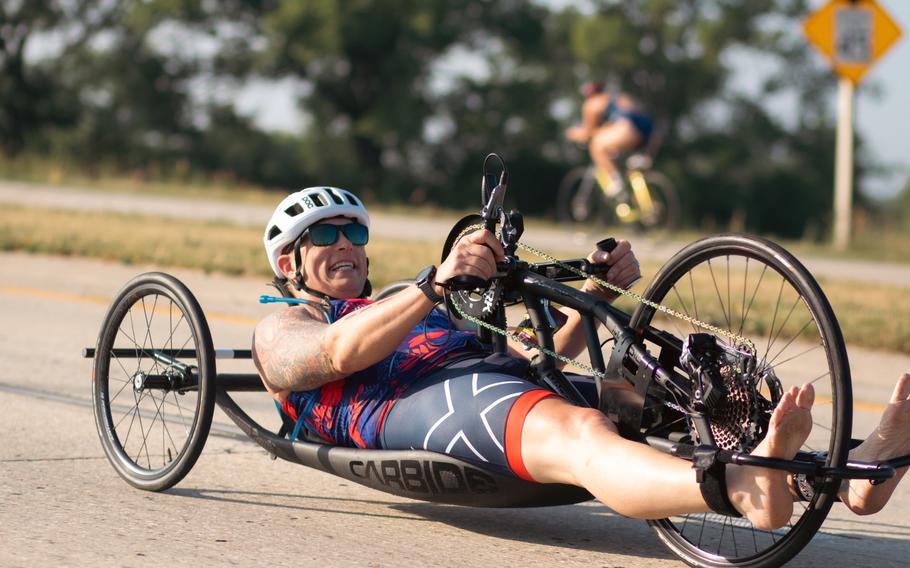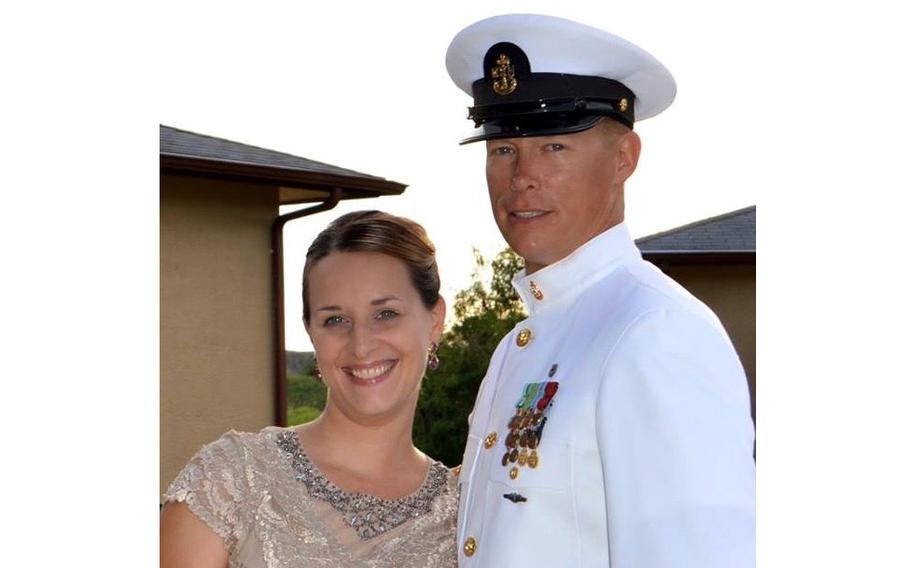
Navy veteran Jay McManus competing at Leon’s Triathlon, a paralympic development race, in July 2023. McManus is competing Sunday, Oct. 29, 2023, in the 48th Marine Corps Marathon. (Semper Fi & America’s Fund)
WASHINGTON — Jay McManus is no longer a newcomer to the Marine Corps Marathon.
After training for three years, due to the coronavirus pandemic canceling the 2020 and 2021 marathons, McManus finally got to compete as a push-rim athlete last year. He finished the race in about 3 hours and 34 minutes.
“That was such an emotional event. I honestly couldn’t tell you which was harder — to push up the hills or to contend with the emotions to the finish line,” McManus said.
The Navy veteran is returning to compete this time as a hand cyclist for the 48th Marine Corps Marathon on Sunday after sustaining a wrist injury.
More than 23,000 people will run in this year’s marathon, said Kristen Loflin, public relations coordinator for the Marine Corps Marathon Organization. More than 6,200 service members, veterans and foreign troops are scheduled to participate in the race.
The marathon begins near Arlington National Cemetery, and runners will make their way over the Key Bridge into Georgetown and pass scenic spots along the National Mall and Tidal Basin in Washington.
McManus, 48, served in the Navy for nearly 22 years before medically retiring. He joined the Navy in 1997 at 22 after working for a construction company in southwest Michigan that was about to be dissolved.
He resisted the military initially but growing up in a Navy family — the branch in which his father, uncle and brother served — it was an easy choice.
“As my father always put it, ‘You’ve got a choice — you can sleep in a warm bed with hot meals or you can sleep in the dirt and eat out of a can,’” McManus said. “I like warm beds and warm meals.”
He started off as an auxiliary serviceman before entering diving school in 2005 and becoming a Chief Navy diver. He had many duties during his career including tours in Iraq and Afghanistan, but one assignment that stands out is a three-month mission to Palau in the South Pacific that involved repatriating 11 missing-in-action service members from a World War II B-24 bomber.
“Of all the things I had the privilege to do in my career, that is kind of the pinnacle and most honorable job I had the pleasure of working with. That opportunity to bring home fallen brothers and sisters, and give families closure, hands down one of the most honorable things I ever got to do,” McManus said.
His career, and life, took a turn in July 2010 after an accident in Panama City Beach, Fla. Eight months after leaving Afghanistan, he was on a trip with the Navy Experimental Diving Unit when he was stung in the left knee by a stingray. A barb from the stingray was undetected by initial X-rays and remained in his knee for four months until he tore his patellar tendon.
McManus had three surgeries, one each month, from November 2010 through January 2011.
After the surgeries, he returned to active duty and ran his first half-marathon, Thanksgiving 2014 in Guantanamo Bay, Cuba. But he started having problems with the leg while running the race. Three more surgeries were performed, forcing him to retire in 2019.

Undated photo of Navy veteran Jay McManus and his wife, Laura. McManus is competing Sunday, Oct. 29, 2023, in the 48th Marine Corps Marathon in Washington. (Semper Fi & America’s Fund)
McManus hit 20 years of service in 2017 and was given the option to take his retirement or go to a medical board. After submitting his retirement paperwork, he was found unfit during his physical. A traumatic brain injury, or TBI, was spotted during the process that included multiple dead spots in the right frontal lobe, a cyst on the brain and significant deterioration of his spine and joints.
Other things discovered included a lump on his thyroid from radiation exposure, and some post-traumatic stress disorder issues, or PTSD, from his time in the Middle East.
In January 2018, McManus attended a selection camp with the Navy Wounded Warrior Program at Naval Station Mayport, Fla. He was competing to be on the Navy’s team at the Defense Department Warrior Games in Colorado later that year.
McManus admitted he was in a dark place dealing with depression and anxiety.
“When I went to that camp, my intent was to just go for a long swim and make it look like an accident and not come home,” he said.
The adaptive sports at the camp, McManus said, gave him a renewed purpose by seeing the community and realizing there was a way forward. He was selected to compete in several events for the Navy team, including track in a push-rim wheelchair and handcycling.
McManus ran his first race at the Warrior Games and “did very poorly.” But McManus won a bronze medal in cycling.
He became acquainted with a new program started in 2019 by the nonprofit Semper Fi & America’s Fund called Runner Battalion while he was an outpatient at Walter Reed National Military Medical Center in Bethesda, Md.
The fund was started in 2003 by military spouses to provide bedside assistance to those wounded or injured while serving in Iraq and Afghanistan. The organization has expanded through the years to provide a variety of programs, including sports, to assist wounded veterans in all branches of the U.S. armed forces.
In 2020, he got his racing wheelchair through nonprofit grants and started training with the Runner Battalion for the 2020 Marine Corps Marathon as a push-rim athlete.
In addition to the Marine Corps Marathon last year, McManus also participated in Warrior Games — this time he won a gold medal in cycling track/field and a silver medal in wheelchair rugby.
Michelle Hall, McManus’s case manager at Semper Fi & America’s Fund, first started working with him in 2018 because he was looking for a service dog. Since that time, Hall said the two of them talk regularly.
“It’s motivating to see someone go from a dark space to what I call an elite athlete,” Hall said. “He has become a great athlete … but it’s motivating to see how all the different parts of his life work in what he’s done through his recovery through adaptive sports.”
McManus will be part of Runner Battalion’s 104-member team Sunday, 11 of whom are competing in handcycling. This year will be different for McManus because as a push-rim athlete, you compete in a forward-leaning position and lack the gears that hand cyclists have. Now he will have those gears that can help on hills and do this from a laid-back position.
McManus has a personal goal of completing the race in less than two hours to qualify for the Boston Marathon. But he is looking forward to competing with his teammates and remembering the bigger picture.
“One of the personal motivations I have for being so proactive and involved with adaptive sports … is that if there is a person out there in a dark place or who is struggling with mobility issues, they can see that there is a way forward,” McManus said. “There is a community that is still active and that we can absolutely achieve anything that we used to be able to do.”